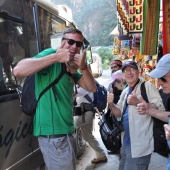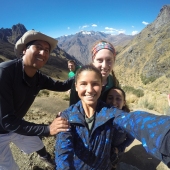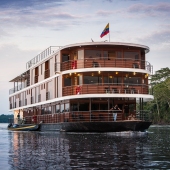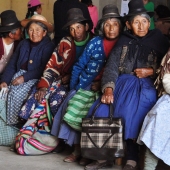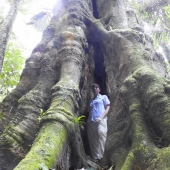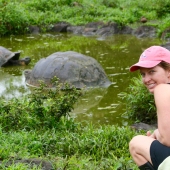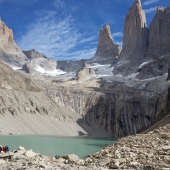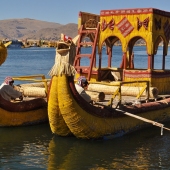
How Many Miles will an Airline Compensate You for Fainting on a Flight?
It was never my intention to find out the answer to that question. But if you guessed 20,000 miles, you are correct.
Let me make it clear that Delta Airlines in no way caused me to faint on my flight from Lima, Peru to Atlanta. But what happened after I fainted, is why they compensated me with 20,000 frequent flyer miles. The story began after an amazing trip to Machu Picchu. With activities, hikes, dinners and late nights. In other words, I was busy right up to the minute I boarded the flight after midnight. In Lima, there is one final security check at the gate. You are not allowed to take fluids (including water) on board the flight and I slugged down as much water as I could under the watchful eye of the security agent as he rifled through my carryon bag.
No Drinking Water for Economy Passengers
Then I boarded the flight and found my seat in Economy Plus section. Economy was nearly full and although Economy Plus had a few seats open it was not possible to ask for water ![]() because flight attendants were busy with pre-flight activities. Right after take-off my seat mate moved to an empty row and I had 2 seats by the window to myself. I got comfortable and planned to hit up the beverage cart before going to sleep. But what happened next was totally unexpected.
because flight attendants were busy with pre-flight activities. Right after take-off my seat mate moved to an empty row and I had 2 seats by the window to myself. I got comfortable and planned to hit up the beverage cart before going to sleep. But what happened next was totally unexpected.
As I regained consciousness, the first thing I was aware of was the humming noise of the plane engines, and I had the sensation that I was hanging upside down. I realize now that when I fainted, by head fell forward and because of my seat belt, I stayed mostly upright. No one noticed my head dangling forward and swinging from side to side with the motion of the plane because everyone was settling down to sleep. It was dim and I looked like I could have been asleep. For how long, I don't know.
As soon as I was conscious enough to realize that I had fainted, I attempted to call a flight attendant to help me, but in case you've never tried it, the TV screen must be functional and must be on the HOME page. I was a little disoriented and could not find my glasses or the call button. After several feeble attempts to scroll through fuzzy screens I gave up. I raised my arm in the air and yelled out the name of one of my friends seated behind me in Economy, hoping that one of them could see me. One of my friends moved up and sat next to me. I explained what happened and she informed the flight attendant who happened to be nearby with the beverage cart. The flight attendant said she was busy and would return to assess the situation after beverage service. At least I finally got some water.
How to make a medical self-diagnosis at midnight on an international flight
Meanwhile I slumped next to the window wondering what was wrong with me. Did I have a heart attack? A stroke? What else could it be? I was healthy and I take no meds. I have low everything, including blood pressure and cholesterol. While my head was spinning with the whatever-it-was-that-caused-me-to-faint, I was simultaneously trying to determine if I was sick. Would I faint again? Would something worse happen? Still no contact from the flight attendant.
After fitful bouts of sleeping, I wanted to test my ability to walk and got up to go to the restroom and stopped by the galley for more water. Apparently my face told the story, because the flight attendant in the galley asked me what was wrong. When I told him I fainted, he raised both his arms up in the air and shook his head side to side, while exclaiming that he knew nothing about it! He didn't seem worried that I might have the potential for another medical event. I wobbled back to my seat for the remainder of the flight. Not a single flight attendant came by to offer water, comfort or to check my pulse!
When we reached Atlanta, my 2 friends rallied to my support and carried my personal belongings and clutched my elbow to prevent a fall. I felt shakey, but it's hard to say if it was from the fainting spell or from lack of sleep. As we paraded off the plane walking by the line of flight attendants, the attendant I had met in the galley recognized me and gave me an "atta girl" arm swing and an enthusiastic, "you made it!"
Trying to Reach a Human at Delta
Suffice it to say, "there's no place like home," became more meaningful than ever. Experiencing an unexpected health problem on the ground is bad enough but to have it happen in the air is an extra level of fright. And apparently having it on a Delta flight, where access to personnel trained to identify and assess potential medical problems, is to be altogether avoided. Passengers should not have to exit a Delta flight muttering, "I survived."
Coping with a medical event on board a flight is one problem. But living through the misery of trying to make contact with a real person at Delta to report the issues later is another. I went to the Delta website and followed the protocol to write a complaint online. I got the notification emails saying I was successful. But I never heard back. Finally, I resorted to sending them a message on Twitter. About 2 months after getting home I finally talked to a real person who was polite, engaging and seemed genuinely interested in the issues I wanted to bring to Delta's attention.
The "Issues"
First issue is that the attendant call button should not be tied in to the TV screen. It should be a separate button easily accessed from your seat. If the screen is not functioning or you're not on the home screen, the attendant can be called. The second thing is that attendants should be trained to understand that when someone faints, there is usually an underlying cause. And at the very least, a person who has fainted on a flight should be monitored.
I found out after visiting a local doctor that I likely fainted due to exhaustion and dehydration. Now I guzzle water before every flight, and after I board I ask for water. When I get the "flight attendant eyeroll with the you're-going-to-be-one-of-those expressions," I threaten to faint if they don't bring it! That's one way to ensure prompt service.
One last thing. I don't recommend this as a strategy for accumulating miles. It's much too stressful.


